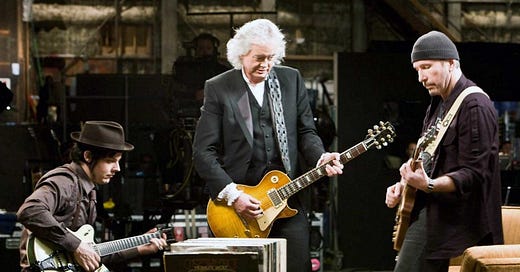There are few things more interesting to me than the creative process.
What inspired this song?
Why did this flop?
How did this get made?
There are so many great documentaries that chronicle that very journey. Here’s one movie each for live theatre, comedy, visual art, music, and the movies:
Movies: Lost Soul: The Doomed Journey of Richard Stanley’s “Island of Dr. Moreau” (2014)
The story of the insane scandals related to the remake of “Island of Dr. Moreau” — originally a novel by H. G. Wells — , which was brought to the big screen in 1996. How director Richard Stanley spent four years developing the project just to find an abrupt end to his work while leading actor Marlon Brando pulled the strings in the shadows. Now for the first time, the living key players recount what really happened and why it all went so spectacularly wrong.
Fine, we’ll start with a movie about making a movie.
A true story about making a movie.
Making a movie is hard.
Making a movie with Marlon Brando is damn near impossible.
And it’s amazing that Brando had notoriously stopped giving a shit almost 30 years prior and he wasn’t even the most difficult part of making that movie.
This documentary, which follows the unbelievable behind the scenes of what became 1996’s The Island of Dr. Moreau, is absolutely bonkers. While most making-ofs feature casting decisions or going way over schedule and budget, this one features the world’s smallest man, real-life warlocks, and, of course, Marlon Brando.
Theatre: ShowBusiness: The Road to Broadway (2007)
The film focuses on four musicals, through the difficulties of pre-production, their openings, attendant publicity around the shows, and their reviews, through the 2004 Tony Award competition. The four musicals documented for the film were: Wicked, Taboo, Caroline, or Change, and Avenue Q.
Making a successful Broadway show might be even more difficult.
1 out of every 5 Broadway shows make their money back.
Perhaps director Dori Berinstein had amazing foresight and knew what shows in the 2004 Broadway season would tell that story, or perhaps she just got lucky. But there were no better shows that year to document those struggles. All four are entirely different in execution, accolades, and financial success.
Wicked: One of the biggest smashes of all time. Launched the careers of Kristin Chenoweth, Idina Menzel, Joe Mantello, and many others. Zillions of dollars made. Trizillion smiles on little kids’ faces.
Avenue Q: The answer to the trivia question, “Wicked lost Best Musical to this show.” A Broadway hit, but a much better fit Off-Broadway.
Caroline, or Change: The artiest of the art here. The highest of brow. A transfer from the Public Theatre.
Taboo: The most WTF. The flop of the group. The Crying Game for Boy George. Rosie O’Donnell. Euan Morton. Raúl Esparza.
When your friend asks you what you’re doing this weekend, instead of “Sorry, I can’t, I have rehearsal,” try, “Sorry, I can’t, I have to watch the supremely underseen doc ShowBusiness.”
Music: Beats Rhymes & Life: The Travels of A Tribe Called Quest (2011)
Having forged a 20-year run as one of the most innovative and influential hip hop bands of all time, the Queens NY collective known as ‘A Tribe Called Quest’ have kept a generation hungry for more of their groundbreaking music since their much publicized breakup in 1998. Michael Rapaport documents the inner workings and behind the scenes drama that follows the band to this day. He explores what’s next for, what many claim, are the pioneers of alternative rap.
I love Tribe. This documentary not only shows how diabetes took down one of the greatest hip hop groups of all time, but it explains the double meaning behind, “Bust off on your couch, now you got Seaman’s Furniture.”
I have nothing more to say, it’s clear you need to see this. So instead, please enjoy my raking of every Tribe studio album:
6. The Love Movement (1998)
5. Beats, Rhymes and Life (1996)
4. We Got It from Here… Thank You 4 Your Service (2016)
3. The Low End Theory (1991)
2. Midnight Marauders (1993)
1. People’s Instinctive Travels and the Paths of Rhythm (1990)
Visual Art: The Universe of Keith Haring (2008)
A portrait of New York artist Keith Haring. The film looks to Haring as an artistic role model for his preternatural talent, of course, but also for his infectious lust for life that had him as committed to social activism and teaching children as to his latest painting.
I have always loved Keith Haring’s work. He’s all throughout our home: our living room rug, pillows, and prints. Our new home felt cozier when we brought Keith into it.
But despite always being attracted to his round little guys, I didn’t actually know much about him until watching this documentary.
And I fell in love with his work even more.
I love the spirit that bleeds through his colors.
I love his commitment to access.
I’m charmed by the speed at which we worked.
Madonna and Andy Warhol were charmed by him, too.
He was so lovable and that personality shines in his work.
Comedy: We Need to Talk About Cosby (2022)
During his nearly 50 years in show business, Bill Cosby became one of the most recognizable Black celebrities in America. With a career that included an astronomical rise on television in the mid-1960s; work in children’s programming and education; legendary stand-up performances and albums; and an epoch-defining hit sitcom, The Cosby Show, Cosby was a model of Black excellence for millions of Americans. But now, thanks to the brave and painful testimonies of dozens of women, we know there was a sinister reality to the man once extolled as “America’s Dad.”
A word choice for “comedy,” I know. But it’s an important examination of the world’s most famous comedian.
This is an incredibly difficult watch. It’s four hours of examining why we reacted the way that we did when we found out who Bill Cosby really was. Not listening to survivors. Ignoring black women. Refusing to believe what was right in front of us the whole time. And grappling with the fact that we deified a comedian.
Director W. Kamua Bell, himself a black man, comedian, and activist, lets those closest to the story tell it, while he and the viewer are left to confront our own misgivings.
He puts it so well at the end when he says,
“There were times when I was making this that I wanted to quit. I wanted to hold on to my memories of Bill Cosby before I knew about Bill Cosby. I guess I can, as long as I admit, as long as we all admit, that there’s just a Bill Cosby we didn’t know. And if we really learn the lessons that this Bill Cosby (the projected family man) was trying to teach us: be smart and bold and not just to be good, but also to do good — then we can all help create a world that makes this Bill Cosby (the rapist), and others like him, less possible.”
Have you heard about our podcast, The Vince Vaughn-a-thon?
Announcing Our New Podcast: The Vince Vaughn-a-thon
Join us for our year long research project.medium.com
What about our free newsletter, Cut the Cord?
Announcing: Cut the Cord
Great movies on free streaming servicesmedium.com










